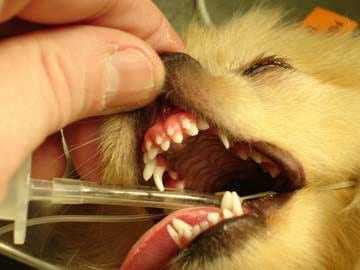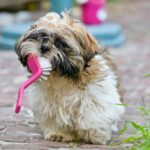The roots of the deciduous teeth resorb in order for the teeth to become loose and fall out. This allows the permanent teeth to erupt normally.
When deciduous (baby) teeth don’t fall out to make way for the permanent teeth, they are called retained deciduous teeth. Retained deciduous teeth should be extracted surgically soon after they are discovered because they will cause dental problems (overcrowding in the mouth, plaque buildup, malocclusion, etc.).
called retained deciduous teeth. Retained deciduous teeth should be extracted surgically soon after they are discovered because they will cause dental problems (overcrowding in the mouth, plaque buildup, malocclusion, etc.).
When both deciduous and permanent teeth are trying to occupy the same position, this double row of teeth overcrowds the mouth, and food gets trapped between the teeth. This trapped food causes periodontal disease. In addition, the double set of roots can prevent normal development of the tooth’s socket and eventually erode gum support around the adult tooth.
These difficulties can be prevented by extracting the retained deciduous teeth as soon as they are seen. If the tooth is extracted early enough, the adult tooth usually will move to its correct position; if the tooth isn’t extracted early enough, there is a greater chance that the adult tooth will be malpositioned. Malpositioned teeth can cause damage to the tongue, palate, mandible, etc. Your veterinarian may decide to remove the retained deciduous teeth at the same time your kitten/puppy is spayed or neutered. If your pet is intended to be a show animal, the dental surgery will, of course, be scheduled differently.
Remember, it is much easier to position the permanent tooth while it is erupting — not after it has erupted. Repositioning after eruption requires orthodontic care to keep your pet’s mouth healthy.

